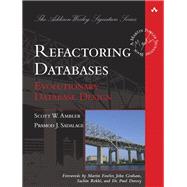
Note: Supplemental materials are not guaranteed with Rental or Used book purchases.
Purchase Benefits
What is included with this book?
Scott W. Ambler is a software process improvement (SPI) consultant living just north of Toronto. He is founder and practice leader of the Agile Modeling (AM) (www.agilemodeling.com), Agile Data (AD) (www.agiledata.org), Enterprise Unified Process (EUP) (www.enterpriseunifiedprocess.com), and Agile Unified Process (AUP) (www.ambysoft.com/unifiedprocess) methodologies. Scott is the (co-)author of several books, including Agile Modeling (John Wiley & Sons, 2002), Agile Database Techniques (John Wiley & Sons, 2003), The Object Primer, Third Edition (Cambridge University Press, 2004), The Enterprise Unified Process (Prentice Hall, 2005), and The Elements of UML 2.0 Style (Cambridge University Press, 2005). Scott is a contributing editor with Software Development magazine (www.sdmagazine.com) and has spoken and keynoted at a wide variety of international conferences, including Software Development, UML World, Object Expo, Java Expo, and Application Development. Scott graduated from the University of Toronto with a Master of Information Science. In his spare time Scott studies the Goju Ryu and Kobudo styles of karate.
Pramod J. Sadalage is a consultant for ThoughtWorks, an enterprise application development and integration company. He first pioneered the practices and processes of evolutionary database design and database refactoring in 1999 while working on a large J2EE application using the Extreme Programming (XP) methodology. Since then, Pramod has applied the practices and processes to many projects. Pramod writes and speaks about database administration on evolutionary projects, the adoption of evolutionary processes with regard to databases, and evolutionary practices’ impact upon database administration, in order to make it easy for everyone to use evolutionary design in regards to databases. When he is not working, you can find him spending time with his wife and daughter and trying to improve his running.
About the Authors xv
Forewords xvii
Preface xxi
Acknowledgments xxvii
Chapter 1: Evolutionary Database Development 1
Chapter 2: Database Refactoring 13
Chapter 3: The Process of Database Refactoring 29
Chapter 4: Deploying into Production 49
Chapter 5: Database Refactoring Strategies 59
Chapter 6: Structural Refactorings 69
Chapter 7: Data Quality Refactorings 151
Chapter 8: Referential Integrity Refactorings 203
Chapter 9: Architectural Refactorings 231
Chapter 10: Method Refactorings 277
Chapter 11: Transformations 295
Appendix: The UML Data Modeling Notation 315
Glossary 321
References and Recommended Reading 327
Index 331
The New copy of this book will include any supplemental materials advertised. Please check the title of the book to determine if it should include any access cards, study guides, lab manuals, CDs, etc.
The Used, Rental and eBook copies of this book are not guaranteed to include any supplemental materials. Typically, only the book itself is included. This is true even if the title states it includes any access cards, study guides, lab manuals, CDs, etc.